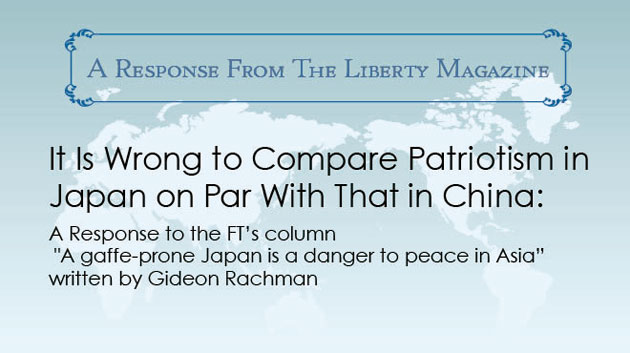It Is Wrong to Compare Patriotism in Japan On Par With That in China:
A Response to the FT's column "A gaffe-prone Japan is a danger to peace in Asia" written by Gideon Rachman
In “A Gaffe-Prone Japan is a danger to peace in Asia”, which was Gideon Rachman’s August 13th column, it might have been correct to report, “Beefing up the Japanese navy is arguably a legitimate response to China’s arms build-up.”
However, was it correct for Mr. Rachman to proclaim that the Yasukuni Shrine was “…designed to give maximum offense to its Asian neighbours…” and “(visits to Yasukuni Shrine) have invariably caused great offense elsewhere in Asia”?
These remarks give the impression that the whole of Asia is worried about the Abe administration, but if that suspicion were true, why then would the Philippines back the rearmament of Japan as reported in the FT interview with the Philippine’s foreign minister, Albert del Rosario, last December?
In addition, when he referred to the Yasukuni issue, Mr. Rachman appeared to accept the historical perception that China proposed after the Second World War. Was his understanding a ‘true’ estimation of the historical record accepted throughout all countries of Asia? What was, in fact, the Greater East Asian War?
The West’s “Division of China” started with the 1840 Opium War. Britain acquired Hong Kong and Shanghai as bases, and made the entire Yangtze River its sphere of influence.
One of the causes Japan fought for was the liberation of Asia from Western colonialism and the abolishment of racial discrimination. The following is an excerpt from chief editor’s column.
Moreover, “Japan fought the First Sino-Japanese War and the Russo-Japanese War to block Russia’s southward advances, and it was forced to annex and rule the Korean Peninsula for Japan’s “defense zone.”
When the Soviet Union came into being in 1922, one reason why Japan supported the founding of Manchukuo was to prevent East Asia from turning communist.
After the Russo-Japanese War, Japan and America came into direct conflict over their interests in China. In the Second Sino-Japanese War in 1937, America supported the Kuomintang, and in actuality, it entered a “war by proxy” against Japan. Japan was driven into a corner by such things as a post-Great Depression change to bloc economies, the formation of an anti-Japanese ABCD encirclement, and the American oil embargoes, and this led to the outbreak of war between Japan and the U.S. in 1941.
In other words, Japan was forced to fight a “war of self-defense” against white colonialism based on racial supremacist notions as well as to defend itself against communist expansionism.
In testimony to the U.S. Congress after the war, General MacArthur clearly stated, ‘Their purpose, therefore, in going to war was largely dictated by security.'”
It should be noted that although China continues to revile Japan over historical issues, it was thanks to Japan’s struggle that Western countries were chased out of China. This is a historical reality as evidenced by the fact that before the Greater East Asian War, the world had only 69 independent countries, but now there are nearly 200 ones.
During the wartime, the United States was not fully aware of the threat of communism. After China became a communist country, America regretted that it imposed a pacifist constitution on Japan.
Asian and African countries are worried about China’s exploitative character and its advancements in the regions, which have been, in their very essence, acts of colonialism. Nigeria’s central bank chief, Mr. Lamido Sanusi, even called it “a new form of imperialism” in a FT’s article on March 12th.
Of course, Japan must accept blame for not changing its pacifist constitution after WWII. It had a chance to revise the document, which the United States drafted when it occupied the country. The premise of the Japanese Peace Constitution was that “peace loving people of the world” surrounded Japan. It was stated in its preamble. However, China’s 2013 military spending alone, as revealed in March, has increased by 10.7%.
Not only Japan, but other South Asian countries, too, have been feeling threatened by China, and they are expecting Japan to be a balancing factor in the region.
Furthermore, it’s wrong to discuss the nationalistic character of Mr. Abe on par with that of China’s leadership. How can you compare China, a country that still lacks free speech and human rights, and strictly controls political activities, which easily controls public opinion and intensifies anti-Japanese sentiment, to Japan, unless it gives its people the right to know? An autocratic country is more prone to war than a democratic country since it does not need its peoples’ consent to wage war. (Kant stated this idea in his Eternal Peace.) With regard to nationalism, it is, of course, necessary to perceive the differences between an autocratic country’s nationalism and a democratic nation’s patriotism.
On the same day, an editorial in the New York Times correctly stated, “(Beijing’s) confrontational approach is unwise (…) (Beijing) should focus on its serious domestic problems…”
In closing, I’d like to express my sincere hope for the creation of an impartial and decent argument on Asia’s historical issues.
Hanako Cho
Senior editor



















